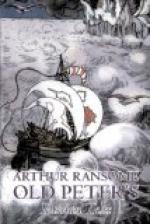“Are we near the top now? Answer me, can’t you! Answer me at once, or you’ll pay for it later. Are we near the top?”
“Very near,” said the old man.
And as he opened his mouth to say that the sack slipped from between his teeth, and bump, bump, bumpety bump, the old woman in the sack fell all the way to the very bottom, bumping on every step. That was the end of her.
After that the old man lived alone in the hut. When he wanted tobacco or clothes or a new axe, he made the goat sneeze some gold pieces, and off he went to the town with plenty of money in his pocket. When he wanted his dinner he had only to lay the tablecloth. He never had any washing up to do, because the tablecloth did it for him. When he wanted to get rid of troublesome guests, he gave them the whistle to blow. And when he was lonely and wanted company, he went to the little hut under the pine trees and played with the little queer children.
LITTLE MASTER MISERY.
Once upon a time there were two brothers, peasants, and one was kind and the other was cunning. And the cunning one made money and became rich—very rich—so rich that he thought himself far too good for the village. He went off to the town, and dressed in fine furs, and clothed his wife in rich brocades, and made friends among the merchants, and began to live as merchants live, eating all day long, no longer like a simple peasant who eats kasha one day, kasha the next day, and for a change kasha on the third day also. And always he grew richer and richer.
It was very different with the kind one. He lent money to a neighbour, and the neighbour never paid it back. He sowed before the last frost, and lost all his crops. His horse went lame. His cow gave no milk. If his hens laid eggs, they were stolen; and if he set a night-line in the river, some one else always pulled it out and stole the fish and the hooks. Everything went wrong with him, and each day saw him poorer than the day before. At last there came a time when he had not a crumb of bread in the house. He and his wife were thin as sticks because they had nothing to eat, and the children were crying all day long because of their little empty stomachs. From morning till night he dug and worked, struggling against poverty like a fish against the ice; but it was no good. Things went from bad to worse.
At last his wife said to him: “You must go to the town and see that rich brother of yours. He will surely not refuse to give you a little help.”
And he said: “Truly, wife, there is nothing else to be done. I will go to the town, and perhaps my rich brother will help me. I am sure he would not let my children starve. After all, he is their uncle.”
So he took his stick and tramped off to the town.
He came to the house of his rich brother. A fine house it was, with painted eaves and a doorway carved by a master. Many servants were there and food in plenty, and people coming and going. He went in and found his brother, and said,—




